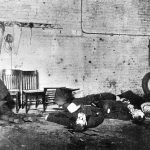
Allenby’s chief claim to fame, though he would not have liked my reminding him of it, was that for a time he was Laurence of Arabia’s commanding officer. This was not easy for anyone, and Edward Allenby’s notoriously bad temper was always on a short fuse: as a Field Marshall he was known throughout the ranks as ‘The Bull’ on account of his great size and violent nature.
Edward Henry Allenby was born in 1861, and gained a good reputation as a cavalry officer in the South African War (against the Boers) of 1899. During the First War he became a General and was in command at Arras in April 1917 when his Third Army advanced nearly four miles on the first day, most unusual in trench warfare since 1914. Readers will remember that battle in the trenches largely consisted of gainng a few yards on Wednesday and losing them on Thursday.
Then he was sent to Palestine in June 1917. He was to command the Egyptian Expeditionary Force. His forces broke through the Turkish lines and Allenby was in Jerusalem by Christmas. Both he and the British Government wanted him to advance north at his customary speed and knock the Turks out of the War, but this initiative was stopped by the Ludendorff Offensive (q.v.) in France. He had to send off the best part of his soldiers to the Western Front.
In September 1917 Allenby was in a position to start again, aided by big contingents of Indian troops recently arrived as reinforcements. He had better supplies, artillery, cavalry and aircraft than the Turks, plus the presence of the mystic Lieutenant T.E. Laurence (q.v.) who was busy stirring up an Arab revolt in the Hijaz. The relationship between Allenby and Laurence was always strained, as the mystic did not believe in army-type disciplines and found saluting people ridiculous. As a serving Army officer, he also preferred Arab clothing to khaki uniform.
Allenby controlled his irritation with Laurence, defeated the Turks at Megiddo, occupied Damascus and then advanced 360 miles (in 38 days), eliminating three Turkish armies in the process. The Turks willingly signed an armistice in October, 1918.
Now began Allenby’s period as diplomat and statesman. From 1919 to 1925 he was British High Commissioner in Egypt, showing great talent in the post, despite his by now famous short fuse. England declared Egypt a British Protectorate, which caused a bloody nationalist uprising, and the imprisonment in Malta of its leader, one Saad Zaghlul. It was Allenby who kept his head and persuaded the British Government to release Zaghlul. Allenby realised before anyone else that the Protectorate was unable to be maintained – so he convinced the Government to abolish it.
In 1922, when Allenby was sixty-one, Britain issued a declaration recognizing Egypt as an independent sovereign state, though she retained for British control the Suez Canal, and the right to keep British troops in the Canal Zone.
He died in 1936 at seventy-five. The actor Jack Hawkins played the part of Allenby accurately in David Lean’s film Laurence of Arabia.









Leave A Comment